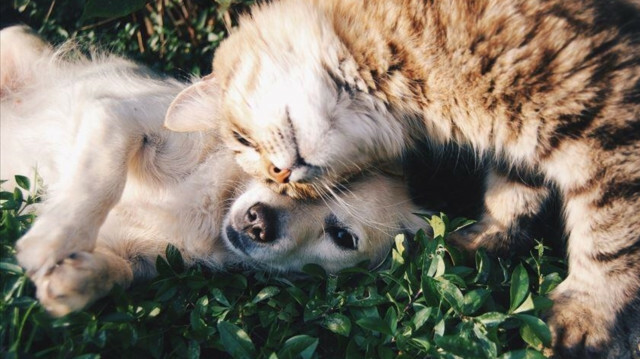
Kursat Ozer's Istanbul clinic becomes haven for pet owners desperate to find cures
A Turkish veterinarian and his 15-member team are renowned for rescuing animals who find themselves near death, afflicted with illnesses that are hard to diagnose.
The Istanbul clinic of Kursat Ozer has turned into a haven for owners desperate to find a cure for their pets' mysterious ailments, making him like a veterinary version of Dr. House, the famed TV disease sleuth.
Ozer, 57, and his team in the working-class Zeytinburnu district on the city’s European side work hard to treat cats, dogs, birds, and even the occasional iguana.
He opened the doors to his clinic for Anadolu Agency to mark International Cat Day on Sunday – an occasion dedicated to our favorite felines by the International Fund for Animal Welfare since 2002.
As queen of the cities, Istanbul is also known for the felines wandering its historic streets, living lives that are always adjacent to humans, sometimes intersecting, and frequently affectionate.
One can see cats during concerts or lying on the metro turnstiles, yawning, oblivious to the harried commuters, and sometimes trying to share a lunch with upright Istanbulites along the shores of the Bosphorus.
Locals love to care for cats, and the sight of residents feeding strays on the streets comes as no surprise.
Among those who care for the idiosyncratic animals is Ozer.
Born in the eastern province of Erzurum, Ozer learned about the medical treatment of animals from the prestigious Istanbul University Veterinary School.
A longtime professor of surgery, Ozer retired from the university faculty only recently, and he brings more than 37 years of experience to his diagnosing skills.
Ozer has boosted his professional experience with stints in the US, Britain, and Japan, and has also taught at universities in Bosnia and Herzegovina and Azerbaijan.
His two-story clinic, boasting cutting-edge technology from blood tests to innovative visualization techniques, opened its doors over two decades ago, in 1999.
- ‘Animal love in Turks' genes’
“Animals needing surgery come to us from more than 90 clinics” from both Turkey and abroad, he said.
“Turkish people have a love for animals in their genes.”
“As a nation, we love animals,” he said, explaining that in the old Ottoman Empire, birdhouses were built outside houses or palaces, something not seen in other countries.
The latest such birdhouses can be seen outside the mausoleum in the capital Ankara of Turkey’s founding father, Mustafa Kemal Ataturk.
The Ottoman-era Gurabahane-i Laklakan, Turkey’s first animal hospital, was built in the 1800s especially to care for storks in the northwestern province of Bursa, a stop along the birds’ migration route, according to Ozer.
He related stories about the Muslim Prophet Muhammad’s love of cats. One says that when a cat fell asleep on the sleeve of the prophet and he had to get up, rather than disturb the slumbering feline, Muhammad carefully cut off his sleeve.
In another, Muhammad is said to have ordered his marching soldiers to take a detour around a mother cat who was busy breastfeeding her kittens.
Turning back to animal health care, he said viral diseases in cats, especially respiratory ones, seem to be very common.
But he mentioned a unique feature often seen in cats who fall from balconies.
“There are cats that fall from 200-300 meters (about 650-1,000 feet) and aren’t even injured,” he said.
“Because cats make perfect use of the laws of physics while falling, as they turn their bodies at the last moment and so change their acceleration from gravity.”
In such falls, most cats are injured not due to the fall itself, but from hitting balconies or awnings, according to the Turkish veterinarian, adding that cat owners living on high floors should protect their cats from open windows.
-Canine aid for tumor trouble
Ozer loves to tell stories about his patients, as in a happy-ending story of a dog who initially started off in very bad shape.
The dog had a very large bulk from her vulva that was constantly bleeding.
“She was almost dead,” he remembered.
His team needed to get her to surgery, but it was a tricky situation, as the dog was losing a lot of blood.
As luck had it, an owner at the clinic with a golden retriever who Ozer had previously helped – in that day for a routine checkup – heard the other’s dog’s plight and volunteered to donate blood from his own dog.
With the help of the donated blood, said Ozer: “That day, in a major operation, we took out a tumor weighing 3.8 kilos (8.3 pounds).”
After a month of treatment, the ailing dog is now back to normal.
- Successful diagnoses
He said to make successful diagnoses, a variety of tools are needed in one’s medical kit.
Ozer said as much as possible he follows the innovations and experience shared at professional congresses, both in Turkey and abroad, saying: “People need to constantly improve themselves.”
He highlighted the importance of experience and the need for high-level technical equipment as, unfortunately, “animals can’t tell you their problems.”
Ozer said he formed a five-member team to help animals in the areas of Turkey where forest fires are currently raging, especially in the Aegean province of Mugla.
During the blazes, he said, “farm animals are being cared for in a way, as they’re a source of livelihood for people there, but there’re not many people who understand wild animals.”
Ozer also criticized a long-awaited bill on animal rights which was passed by parliament last month as a missed opportunity.
“It’s just a revision of earlier legislation,” he said. “Yes, the number of fines was increased, but 90% of the problems weren’t solved.”
In the future, the father of three daughters wants to expand his clinic and save even more animals.
“One of my daughters is studying to become a veterinarian, and my youngest wants to be one in the future,” he said, adding: “This is teamwork.”

